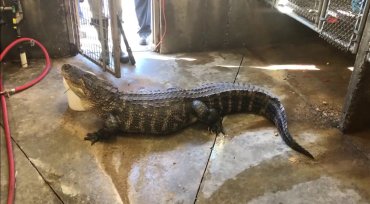Evicted Alligator Gets Legal Representation
Lauren Kruskall & Tristen Woods, Jungle Law
 'Katfish,' the 200-pound PET alligator that was forcibly removed from his home, is now being represented in court by Tristen Woods and Lauren Sierra. The alligator's owner, Sean Casey, fed Katfish a diet of chicken nuggets from Wendy's. Tristen and Lauren explain the situation and what the future holds for the reptilian.
'Katfish,' the 200-pound PET alligator that was forcibly removed from his home, is now being represented in court by Tristen Woods and Lauren Sierra. The alligator's owner, Sean Casey, fed Katfish a diet of chicken nuggets from Wendy's. Tristen and Lauren explain the situation and what the future holds for the reptilian.
In November of this year, an alligator and his owner, Sean Casey, were evicted from their house in Kansas City, Missouri. Next, the alligator was removed from Sean Casey's possessions. So where are they now? We find out because Sean Casey has retained the services of Jungle Law Attorneys.
The Jungle Law practice revolves around exotic pets. They also do a lot of pro bono work for the animal community in Kansas City, focusing mainly on exotic animals. You really wouldn't think there's many exotic animals in Kansas City in the middle of the Midwest, but you'd be surprised how many calls they get regarding cases like this.
Surprisingly, it's not illegal to own an alligator or other exotic pets in Missouri. However, they have to live out the cities. So for example with Katfish, the alligator, if Mr. Casey would relocate about 20 miles outside of Kansas City, he could have Katfish back and live happily ever after with him.
Lauren and Tristen tell us that this is not their first alligator representation. It is actually their fourth. However, in the prior case, one person had three of them and they were able to work out a deal.
Because of who they are and their name of Jungle Law, Lauren thinks that animal owners, not just in Kansas City, but pretty much anywhere, when they hear about them, they automatically think that they're the law firm that fits with what they have and they reach out to them. Obviously, what they care about the most is having the animals ending up in the best situation possible. Sometimes. that isn't always what the client necessarily wants. So it can be a tough challenge. However, in the case of Katfish, his owner was actually a really wonderful owner, not abusive or anything like that. He was very caring and so it is fortunate that this had a happy ending.
Katfish is a large alligator and weighs around 225 pounds and is about 8 feet long. Katfish is also a big fan of chicken nuggets. In fact, he actually only likes chicken nuggets from Wendy's. His owner would frequently take Katfish through the drive-thru at Wendy's and all of the employees knew him.
Sean Casey got Katfish when he was about 14 inches long and about the size of a ruler. Sean has raised him ever since and didn't know that it would grow into this kind of love affair and attachment. Katfish even became part of the family. Sean never worried about his family when Katfish was around. Katfish was so docile, Sean used to take him out on walks. Katfish also basically slept right next to Sean.
Katfish was always comfortable and had all of his needs met. Sean made him a nice, almost like a hot tub setting, little lagoon in his front living room for Katfish. When Sean would watch TV, Katfish was right at his feet.
Relationships with wild animals are pretty remarkable, but their owners train them to learn to trust them. This is something that the Jungle Law attorneys have seen before. However, they are still wild animals. The Jungle Law attorneys are frequently around these animals, but they are still very weary about them. Fortunately, nothing's happened to them yet.
 Currently, Katfish is at Monkey Island in Greenwood, Missouri. They attorneys think that this the best place for him at the moment. They know that Sean really loves spending time with Katfish and probably eventually wants to have him back, but the most important thing with an animal like this is that they have the continued care and a place where they can be financially supported.
Currently, Katfish is at Monkey Island in Greenwood, Missouri. They attorneys think that this the best place for him at the moment. They know that Sean really loves spending time with Katfish and probably eventually wants to have him back, but the most important thing with an animal like this is that they have the continued care and a place where they can be financially supported.
So do Lauren and Tristen think that Sean Casey should be allowed to have Katfish back if he moved outside the city? Lauren explains that there are two things at work here that need to be in play. First of all, obviously Sean needs to be following the law and then the next important thing is making sure that he has the wherewithal to take care of Katfish. Most certainly Sean Casey has the heart to take care of Katfish. He's a great animal parent. A lot of times people get these animals and are irresponsible and don't really care, but one of the great things about Katfish, is he was very plump because he was well fed and well taken care of.
The good thing about Katfish being at Monkey Island is that they have the wherewithal to take care of him. The laws are being followed and Katfish in the best hands possible. But whoever can provide the best outcome is probably the best place for Katfish to be.
Jungle Law does represent Sean Casey and they tell us he received a citation for having an exotic animal within the city limits. Jungle Law is working with the prosecutor in Kansas City to see what they can do regarding Mr. Casey in that instance. But there's no civil litigation currently going on.
Surprisingly, Sean Casey has signed the rights of Katfish over to Dana Savorelli at Monkey Island. Sean had to do this because animal control was willing to give Katfish back, but Sean had to have a suitable home for him. If Sean did get Katfish back and he was found inside the city limits a second time, the next time Monkey Island might not be able to have the advantage of being able to take him back again.
Lauren and Tristen feels that Sean is still living in the city limits and doesn't have the support right now to take Katfish back. No one wants Sean to take on that burden of having to try to find another place outside of the city right now.
Most people think that Katfish is just a reptile and Sean will get over it. But Sean loves this alligator. He even took care of him better than himself. Katfish is currently around four years of age. Alligators in captivity live around 70 years, so it's a big time commitment to have an animal like that.
Along with Katfish, Kansas City Animal Control also confiscated three pythons and a rabbit. His rabbit was named 'Dinner' and was the most beloved animal that Sean had. Sean was at a relatives' house one rainy day in the summer and there was this baby rabbit outside on the driveway. Sean didn't think it could take care of itself, so he took it in and raised it. Because it was a wild animal, animal control unfortunately let the rabbit go.
It's nice to have rescue groups willing to take these animals in, because sometimes when animal control finds these animals, they have to do the quickest solution possible. But when there are rescue groups available for these wild animals to go to right away, it provides a safe haven instead of them being put down or something else along those lines.
Besides representing people like Sean Casey, Jungle Law is also working on an animal abuse law bill. They've drafted an animal abuse law for the state of Missouri at Animal Abuse Law Dot com (ANIMAL ABUSE LAW.COM). Representatives from both sides of the aisle are supporting it politically. The goal is to raise misdemeanors on animal abuse to felonies and to create an animal abuser registry list. Anybody from any state can sign the bill to help get abusers put to justice.
Visit Website
Stressed People Have Stressed Dogs
Dr. John Huber, Clinical Forensic Psychologist
 Dr. John Huber says happy owners generally have happy pets. Alternatively, stressed owners tend to cause their pets to be anxious. This anxiety can cause a myriad of canine behavior problems. However, research shows that if you're the calm, cool, collective kind of person your pet will be relaxed too.
Dr. John Huber says happy owners generally have happy pets. Alternatively, stressed owners tend to cause their pets to be anxious. This anxiety can cause a myriad of canine behavior problems. However, research shows that if you're the calm, cool, collective kind of person your pet will be relaxed too.
Dr. John Huber is a Clinical Forensic Psychologist and said the study involved looking at bad behavior in animals. They started realizing, first of all, it's kind of subjective. This is because one person might think it's bad behavior, but from someone else's point of view, they might think the dog just doesn't know what your expectations are and the they're acting like a dog; they are not acting poorly.
As researchers started looking at this, which this was all subjective from individuals, they stumbled on this idea of, 'How do you rate yourself?' Do you rate yourself as being relatively stressed and relaxed or do you rate yourself as being highly stressed? What they found out was that the higher your stress level was, the worst your animal behaved in your perception.
A lot of that is because dogs have better senses than we do. First of all, they can hear things farther away than we can; about four times farther when it comes to low volume sounds. They also have a much wider range in pitch so they're able to pick up on things with us.
If you go back to some of the studies they've done with different horses and stuff, it was shown that they could pick up on your internal functioning. This includes how your heart rate is and your respiration. So dogs are much more sensitive to our emotions. And you add on top of that the evidence to support this, is that there are seizure dogs out there that can identify you starting a seizure 45 minutes to a half an hour before you actually have the seizure. So they're very intuitive and they pick up on our senses and how we're feeling better than other human beings.
Dr. Huber tells us about his dog that he adopted from the shelter. The dog was an abused dog and he rescued her this summer. To him it was obvious a male person abused the dog. The dog has finally come around and actually sleeps on him during the night. The dog has made a breakthrough and she doesn't run when he walks in the room and things like that anymore. So it's very difficult to pick up on how much of that the abuse or maybe the dog picking up on stuff that he doesn't know he's transmitting.
Is there a way you can make your dog calmer? Can you just act calmer, or would your dog see right through that?
Dr. Huber explains that from a psychologist's standpoint, we know that our bodies react and if we start faking like we're calm, our body will start catching on and actually over time start faking calm with you. So in essence, it will make you calmer. It's not going to happen tomorrow, but if you're stressed out and you want to start doing that, it'll probably take six to eight weeks for your own body to catch on. And once that happens, your pet should go right along with you.
 Many dogs have separation anxiety on a daily basis, while others couldn't care less if you left the house. Is separation anxiety something that is reflected upon our disposition?
Many dogs have separation anxiety on a daily basis, while others couldn't care less if you left the house. Is separation anxiety something that is reflected upon our disposition?
One of the psychologists in Dr. Huber's office has two dogs that are on Prozac, which helps those dogs and their separation anxiety. What they found out is that the dogs are not destroying things in the house that they used to nor driving the neighbors crazy because they're barking all the time. However, the dogs were already very stressed out animals. He got them from a rescue also and they were already very anxious and shaking all the time and very afraid to go on walks. Now with the Prozac, all of that's kind of gone away and he is able to walk the dogs. They even moved to a new neighborhood and the dogs had no problem adjusting to the new parks.
Anxiety in our pets is a real thing. A lot of it is caused just like in humans. We worry about 9,900 different things that will never go wrong. So that causes our anxiety. Dr. Huber thinks the dogs have had some traumatic experience in their life before us, and his experience, and his partner's experience with his dogs, is they're afraid of what might happen next, because they've had unsettled or uncertain areas in their life. And that's where our stress brings in that uncertainty that scares the dogs and causes their trauma.
So should you be firmer with your pet and instead of picking them up at every little thing and coddling them and telling them in baby talk that everything's going to be okay?
Dr. Huber explains it a lot like human babies. If we coddle them, we don't teach them the skills they need to be resilient. He feels it's the same way with our pets. We need to give them space to be the animal that they are, whether a dog or a cat. However, because not every dog likes to be petted and not every cat likes to be petted, they will introduce you to their level of the nurturing they need and they'll come to you for that. Pay attention to what they have to say. Now if you're stressed out and you don't have time for that, we end up pushing ourselves on them, which again creates more anxiety in the pets.
What Dr. Debbie sees in her practice is that people that think that living within our household is all that a dog needs to be a fulfilled animal. She feels that a lot of this goes back to early socialization. You know when you adopt a pet it has some preexisting phobias, but that's a different thing. As pet owners, we Americans can do a far better job in socializing and exposing our animals to things and not making them so dependent on us. They can sleep all day long unattended and don't have to be entertained. We don't need to feel bad about leaving them if we've socialized them in the right way. She states this is the big change all Americans really need to do.
Dr. Huber says that's where the car ride comes in with his pet. He has a Boxer that needs lots of room and he doesn't have lots of room where he's living. So he takes him for a car ride almost every single day. He takes him down to the park that butts up against a green space. There are deer there and they come out to the park right before sunset. He says his dog is more afraid of the deer than they are of him. However, his dog goes out and runs with the deer and they chase her. He says it is a full-blown run at full speeds for about 35 to 45 minutes. Afterwards, his dog comes and lies down and spreads herself out on the grass and tries to cool off, and then she's done.
 What about the time that we spend ignoring our pets while we are texting and on social media and Facebook, are our animals are picking up on this and is it driving them crazy? Absolutely, according to Dr. Huber. He explains when he is on the phone, his Boxer jumps up on the bed, because the bed and the couch are her safe zones with him. So if his dog wants him to pay attention to her and he gets a text, she puts her foot right on the phone and pulls it away from his face. She also likes the way he scratches her back and massages her hips. So when her hips are bothering her, she will stick them right in his face.
What about the time that we spend ignoring our pets while we are texting and on social media and Facebook, are our animals are picking up on this and is it driving them crazy? Absolutely, according to Dr. Huber. He explains when he is on the phone, his Boxer jumps up on the bed, because the bed and the couch are her safe zones with him. So if his dog wants him to pay attention to her and he gets a text, she puts her foot right on the phone and pulls it away from his face. She also likes the way he scratches her back and massages her hips. So when her hips are bothering her, she will stick them right in his face.
Dr. Huber also tells us about his 13-year-old tomcat who has had the world to himself until this summer when the Boxer came in. The cat is now figuring out how he can manipulate the dog's behavior. He's figured out the best way to do this is to be more involved with Dr. Huber. Before the dog, the tomcat didn't want anything to do with him. The cat was the ruler and Dr. Huber was there to bow down to him. But now the cat sees the dog and he's like, 'I'll just go and sit next to them and I'll try and get up in daddy's lap during dinner,' which just drives the dog crazy and torments her.
The close bond between dogs and their owners has earned them the title of 'Man's Best Friend.' But, the relationship between humans and dogs is so close; humans can influence their temperament. So - just slow down and relax and your pet will too!
Visit Website
How to NOT Train a Dog - Dr. Debbie
 The other day I was walking my dog in a community area and encountered a lady with two Shih Tzus. As we approached, her dogs rallied with barking and tugging on their leashes. I asked if her dogs were friendly, so as to decide if we could approach. The lady scowled, embraced her still barking dogs and grumbled, "Do they look like they're friendly?"
The other day I was walking my dog in a community area and encountered a lady with two Shih Tzus. As we approached, her dogs rallied with barking and tugging on their leashes. I asked if her dogs were friendly, so as to decide if we could approach. The lady scowled, embraced her still barking dogs and grumbled, "Do they look like they're friendly?"
Realizing this dog owner was more unsociable than her dogs, I decided to vamoose, but not before I envisioned this blog topic - how pet owners mold unsocial dog behavior.
Unwanted doggie behavior such as lunging and barking on the leash become established when the dog owner hasn't made it clear what the appropriate behavior is, fails to correct and redirect to a more suitable behavior, or simply reinforces the undesirable behavior through actions or words. Face it - there aren't bad dogs, just poorly trained ones.
Avoid making these top 5 training mistakes:
1. Secluding Your Dog in the Backyard
Keeping your dog in lock down almost guarantees problem behaviors will develop such as biting, inter-dog aggression and phobias to anything from noises to car travel. Isolated dogs lack the experience and confidence when faced with novel situations while socialized dogs adapt easily.
I see it all the time - the dog owner prides herself in keeping her dog safe. "I didn't want Fido to catch any diseases as a pup, so I didn't let him out of our backyard till he was a year old." The overwhelming fear of infectious diseases like parvovirus causes some well-meaning owners to confine their new dog or puppy to the limits of house and yard. Even more extreme is never allowing a puppy to step foot outside until after their last puppy vaccinations! Puppies are most adaptable to new experiences between 6 and 16 weeks - this is the time to expose them to unfamiliar places, people and animals.
That doesn't mean you should take your eight week old puppy to dog parks, but rather to use good sense selecting low dog traffic areas and visiting with family and friends outside of the home that have properly vaccinated pets.
2. Skipping Obedience Training
Going to school is a must for any new dog to a home, whether a puppy or adult. No two dogs are the same, and each learns differently. Formal obedience training is a useful tool to gently reaffirm who's in charge and sets the rules in the house. Statistics show that dogs that go through formal obedience training are less apt to develop behavior problems and be relinquished to shelters.
 3. Reinforcing Fear at the Veterinary Office
3. Reinforcing Fear at the Veterinary Office
In the exam room I cringe when I see a dog owner comforting a nervous, fearful or aggressive pet. That "good boy" and pat on the head reinforces your dog's behavior, making it more likely that on the next hospital visits he'll behave the same, or worse. Some problem behaviors escalate making it difficult for the veterinary staff to examine or treat the animal. This may mean additional costs for sedation or anesthesia for routine medical needs.
It's natural for a pet owner to want to reassure a pet when he is frightened and it can be difficult to hold back the urge to soothe him. However, the best strategy is to ignore those fearful behaviors in the vet office. Don't be tempted to kiss, snuggle or hold Fido on your lap when he is misbehaving. Rather, place the dog on the floor, refocus your dog's attention to you, and cue him to "sit" or "lie down."
4. Not Using Food as a Reward
Food shouldn't just be for the taking. Don't leave food out for your dog to graze whenever he wants and don't give treats just for the sake of giving a treat. Present food and treats as a reward for good behavior such as sitting quietly, going to a pillow, or performing a trick or obedience work. This places you at the top of the household hierarchy. You become the provider of great edibles in the house, and your dog will be motivated to listen to your requests in other situations.
We all love to spoil our dogs and give treats at times. But be sure to give treats for a reason, or you will have a spoiled doggie brat on your hands.
5. Not Exercising Your Pet Enough
Inadequate exercise can result in obesity and boredom, and may lead to problem behaviors like separation anxiety, destructive chewing and excessive barking. Dogs should get 30 to 60 minutes of sustained physical activity each day for optimum mental and physical benefit. And no - letting Buffy run around the backyard during the day is not adequate exercise.
Not all breeds are cut out for all exercise - a Labrador may enjoy retrieving games or swimming, a Jack Russell terrier may thrive with jogging or Frisbee, while a Basset hound will be satisfied with a leash walk.
Your dog can't be a well-adjusted, socialized canine citizen without you, as the pet owner, taking an active role in training. Put the time in, and you'll be thanked many times over with an outgoing, friendly canine pal that can accompany you on life's adventures.
Featured veterinarian known as "Dr. Debbie" on national pet radio program, Animal Radio. Ebook author of "Yorkshire Terriers: How to Be Your Dog's Best Friend"; "Pugs: How to Be Your Dog's Best Friend"; "Mini Schnauzers: How to Be Your Dog's Best Friend"; and "Shih Tzu: How to Be Your Dog's Best Friend." Dr. Debbie's books.
Visit Website
 Listen to the entire Podcast of this show (#992)
Listen to the entire Podcast of this show (#992)





